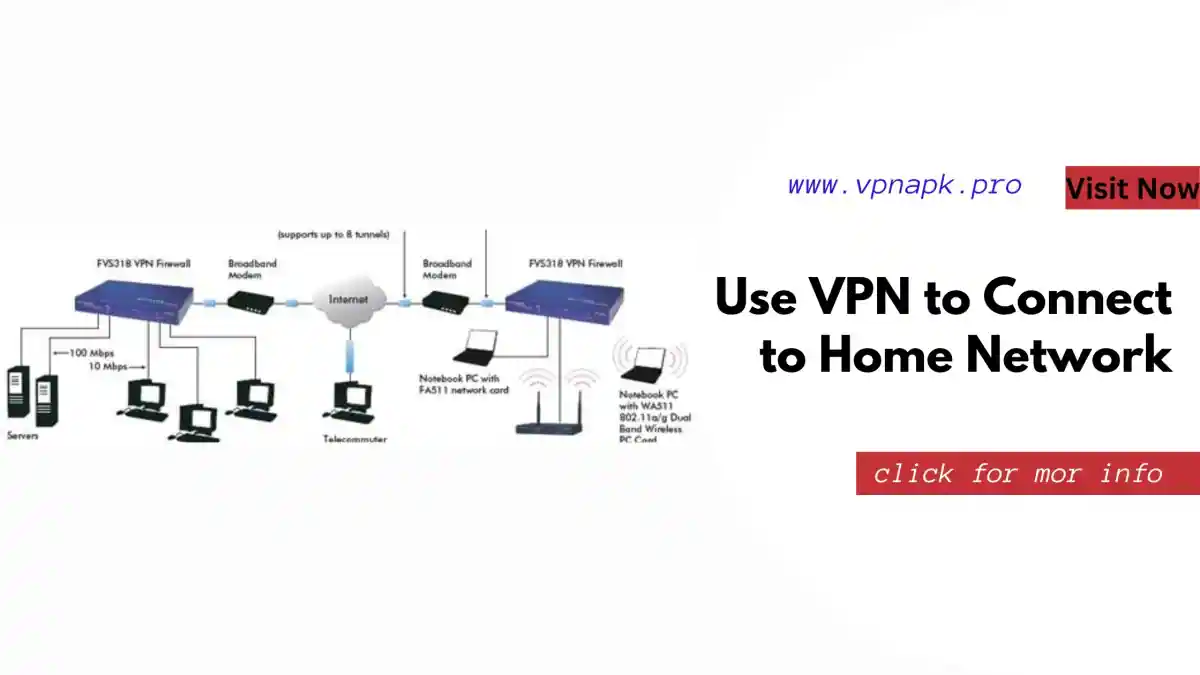In today’s interconnected world, the need for secure and reliable remote access to your home network has become increasingly important. Whether you want to access your files, control smart devices, or simply ensure your online privacy while using public Wi-Fi, using a Virtual Private Network (VPN) for your home network is a smart choice. In this article, we’ll explore the why, how, and benefits of using a VPN to connect to your home network.
Introduction
Imagine being able to access your home computer, files, and devices from anywhere in the world securely. This is where a VPN comes into play. But why would you want to use a VPN for your home network in the first place?
Why Use a VPN for Home Network?
Using a VPN for your home network offers several advantages:
- Enhanced Security: A VPN encrypts your internet connection, making it nearly impossible for hackers to intercept your data. It’s like having a secure tunnel between your device and your home network.
- Privacy Protection: Your online activities remain private because your IP address is hidden. This prevents websites and advertisers from tracking you.
- Remote Access: With a VPN, you can remotely access your home network and its resources from anywhere, just as if you were at home.
- Bypassing Geographical Restrictions: Access streaming services, websites, and content that may be restricted in your current location.
How Does a VPN Work?
Before we dive into setting up a VPN for your home network, let’s briefly understand how a VPN works.
The Basics of VPN Operation
A VPN creates a secure, encrypted connection between your device and a remote server. This server could be located anywhere in the world. When you access the internet through this server, your real IP address is hidden, and your data is encrypted.
Setting Up a VPN for Your Home Network
Now that you know why a VPN is beneficial, let’s explore how to set it up for your home network.
1. Router-Based VPN
You can install a VPN directly on your router. This method covers all devices connected to your home network.
2. Device-Level VPN
Install a VPN app on individual devices for more control. Ideal for scenarios where not all devices need VPN protection.
Choosing the Right VPN Service
Selecting the right VPN service provider is crucial for a seamless experience.
Factors to Consider
- Speed and bandwidth
- Server locations
- Security features
- Customer support
- Pricing
Securing Your Home Network with a VPN
Once your VPN is set up, ensure its security.
Tips for Securing Your Home Network
- Use a strong password for your VPN.
- Keep your router firmware updated.
- Enable multi-factor authentication (MFA) when available.
Benefits of Using a VPN for Home Network
Using a VPN for your home network offers various benefits.
Advantages at a Glance
- Secure data transmission
- Anonymity online
- Access to restricted content
- Protection on public Wi-Fi
Common VPN Troubleshooting
Like any technology, VPNs can encounter issues. Here are some common problems and solutions.
Troubleshooting Tips
- Slow connection
- Connection drops
- Incompatible websites or services
Tips for Optimizing Your Home Network VPN
To ensure a smooth experience, follow these tips to optimize your home network VPN.
Optimization Techniques
- Choose the closest server.
- Select the right VPN protocol.
- Monitor your bandwidth usage.
VPN vs. Remote Desktop: Which is Better?
While VPNs are excellent for secure access to your home network, remote desktop solutions provide a different set of advantages. Learn when to use each.
Comparing VPN and Remote Desktop
- Use VPN for file access and general internet use.
- Consider remote desktop for full control over a home computer.
Privacy and Security Concerns
It’s essential to be aware of potential privacy and security concerns when using a VPN.
Privacy Considerations
- Trustworthy VPN providers
- No-logs policies
- Legal considerations
You also See
- WHAT IS THE #1 BEST VPN
- WHICH VPN IS THE BEST VPN?
- TOP 10 BEST VPN FOR PC
- WHICH BEST VPN APP FOR ANDROID, APPLE, AND PC?
- 9 BEST VPN FOR PUBG MOBILE & LITE
- WHICH IS THE BEST VPN IN THE WORLD?
Conclusion
Using a VPN to connect to your home network is a powerful tool that offers enhanced security, privacy, and flexibility. Whether you’re working remotely, streaming content, or simply browsing the web, a VPN ensures that your connection remains safe and your data remains private.
Frequently Asked Questions (FAQs)
FAQ 1: Is it legal to use a VPN for my home network?
Yes, using a VPN for your home network is legal in most countries. However, it’s essential to use it for legal and ethical purposes.
FAQ 2: Can I use a free VPN for my home network?
You can, but free VPNs often come with limitations, including slower speeds and less robust security. Consider a paid VPN for better performance and features.
FAQ 3: How do I set up a VPN on my router?
The process varies depending on your router model and the VPN service you use. Refer to your VPN provider’s documentation for specific instructions.
FAQ 4: Are there any speed limitations when using a VPN for my home network?
VPN speeds can be affected by factors like server location and your internet plan. While there may be a slight reduction in speed, it’s usually not significant for everyday tasks.
FAQ 5: Can I access my home network from anywhere using a VPN?
Yes, with a properly configured VPN, you can access your home network from anywhere with an internet connection, providing remote access to your devices and files.

